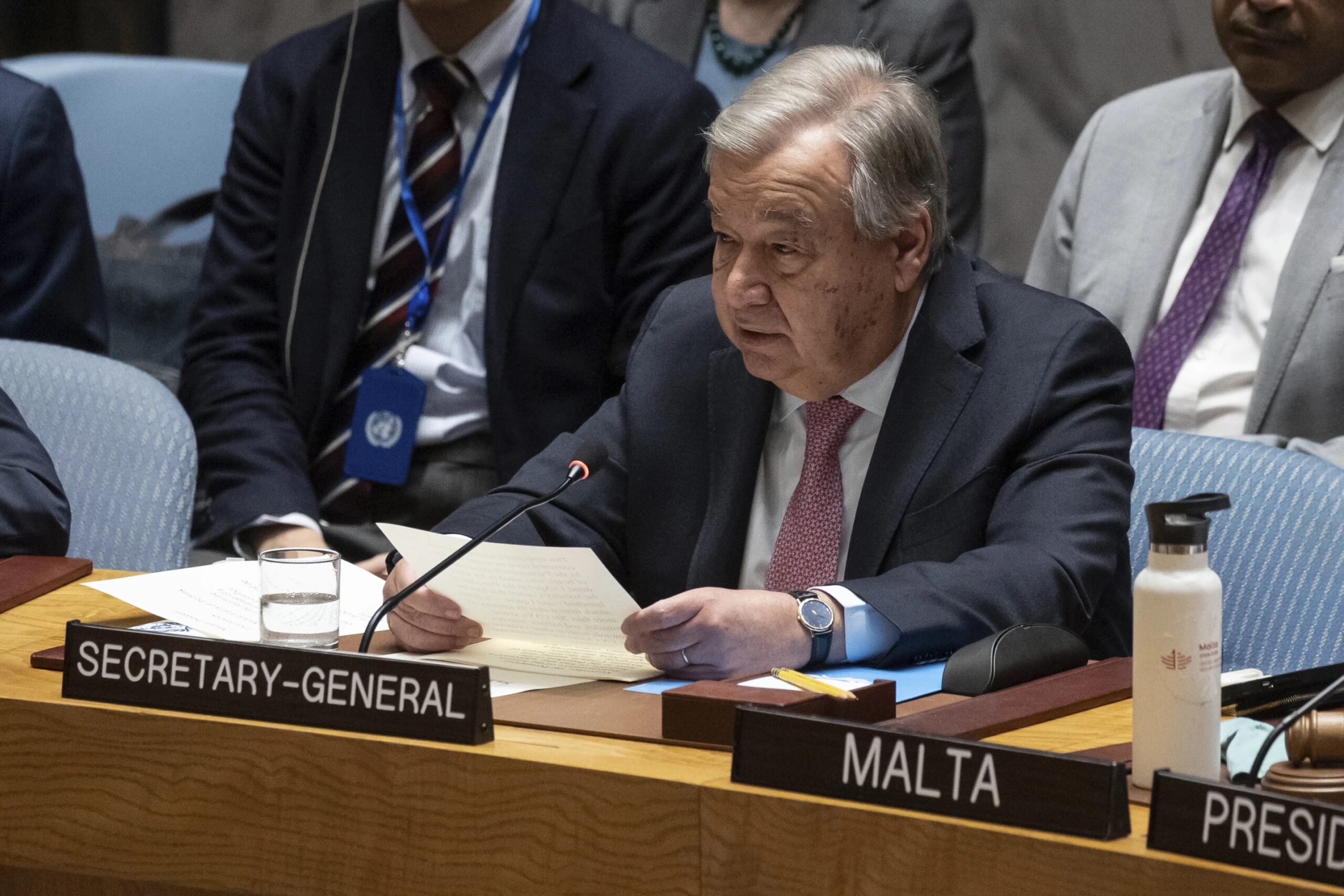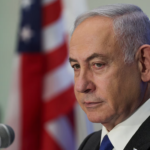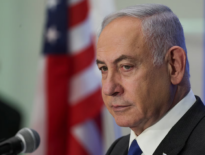World leaders are urging Israel not to retaliate after Iran launched an attack involving hundreds of drones, ballistic missiles and cruise missiles.

British Foreign Secretary David Cameron told the BBC on Monday the U.K. does not support a retaliatory strike, while French President Emmanuel Macron said Paris will try to “convince Israel that we must not respond by escalating.”
The Iranian attack on Saturday, less than two weeks after a suspected Israeli strike in Syria that killed two Iranian generals in an Iranian consular building, marked the first time Iran has launched a direct military assault on Israel, despite decades of enmity dating back to the country’s 1979 Islamic Revolution.
An Israeli military spokesman said that 99% of the drones and missiles launched by Iran were intercepted.
Israel and Iran have been on a collision course throughout Israel’s six-month war against Hamas militants in the Gaza Strip. The war erupted after Hamas and Islamic Jihad, two militant groups backed by Iran, carried out a devastating cross-border attack on Oct. 7 that killed 1,200 people in Israel and kidnapped 250 others.
An Israeli offensive in Gaza has caused widespread devastation and killed over 33,700 people, according to local health officials.
Currently:
— The shadow war between Iran and Israel has been exposed. What happens next?
— US works to prevent an escalation across the Mideast as Biden pushes Israel to show restraint.
— Iran’s attack on Israel raised fears of a wider war, but all sides in the conflict also scored gains.
— Iran and Israel have a history of enmity. What key recent events led to Iran’s assault on Israel?
Here is the latest:
AUSTRIAN FOREIGN MINISTER CONDEMNS IRAN’S ATTACK
BERLIN -– Austria’s foreign minister has spoken with his Iranian counterpart to condemn Tehran’s attack on Israel and call on Iran to rein in its proxies in the Middle East.
Alexander Schallenberg said in a statement he told Iran’s Hossein Amirabdollahian on Monday that “we cannot afford another front in the Middle East. There would only be losers, in the region and beyond.”
Schallenberg said he also urged Amirabdollahian to “exercise Iran’s influence on proxies in the region.”
Austria hosted talks on Iran’s nuclear agreement with world powers in 2015.
Amirabdollahian already spoke on Sunday with German Foreign Minister Annalena Baerbock. A spokesperson for Baerbock, Christian Wagner, said Iran’s ambassador to Germany was summoned to the Foreign Ministry in Berlin on Monday.
OIL PRICES FALL AFTER IRAN’S STRIKE ON ISRAEL IS THWARTED
Oil prices fell on Monday after Iran’s missile and drone strike failed to cause widespread damage in Israel and the U.S. administration made it clear it did not support a wider war with Iran.
Analysts say the chief risk to oil prices from the Israel-Hamas war is if the conflict escalates and disrupts oil supplies from Iran and Persian Gulf producers through the Strait of Hormuz choke point.
The stance taken by Iran, which said the matter “can be deemed concluded” with the retaliatory strikes, and the U.S. position reassured oil traders, who sent the price of international benchmark Brent crude 0.7% lower to $89.82 per barrel in Monday morning trading. That is below the levels just above $90 per barrel seen on Friday before the weekend attacks.
Risks that could send prices higher include any Israeli strike against Iranian oil facilities or tougher enforcement of sanctions against Iran by the U.S. “Any retaliation by Israel … especially one that targets Iran’s oil facilities, will have major implications for energy markets,” said analysts at S&P Global.
Tougher sanctions enforcement against Iranian oil shipments by the U.S. could raise oil prices but would risk higher inflation and pump prices for U.S. motorists in an election year.
4 ISRAELI SOLDIERS WOUNDED IN A BLAST ALONG THE BORDER WITH LEBANON
TEL AVIV — The Israeli military says four soldiers were wounded by an explosion along the northern border with Lebanon.
The military said that the source of the explosion, which occurred overnight, was still unclear. It left one soldier severely wounded, two moderately wounded, and one with light injuries.
The Iran-backed Lebanese militant group Hezbollah said Monday that mines they set up in southern Lebanon near the border detonated after Israeli ground troops encroached on Lebanese territory, incurring casualties.
The incident comes as tensions in the region soared after an Iranian air assault was thwarted by Israel and its allies. Israel has not said whether it will respond.
Since the outbreak of the Israel-Hamas war in Gaza on Oct. 7, concerns have grown that near-daily clashes along the border between Israel and Hezbollah could escalate into a full-scale war.
GERMAN CHANCELLOR CALLS ON ISRAEL TO CONTRIBUTE TO DE-ESCALATION
BERLIN -– German Chancellor Olaf Scholz is calling on Israel to “contribute to de-escalation” in the Middle East following Iran’s attack on the country.
Scholz told reporters in Shanghai on Monday that “Iran must stop this aggression.”
Asked whether he will attempt to dissuade Israeli Prime Minister Benjamin Netanyahu from a military response to Saturday night’s attack, he said there’s widespread agreement that Israel’s success in largely repelling the attack with allies’ help was “really impressive.”
He added that “this is a success that perhaps also should not be thrown away. Hence also our advice to contribute to de-escalation themselves.”
Germany is a staunch ally of Israel.
AFRICAN GOVERNMENTS URGE ISRAEL, IRAN TO AVOID ESCALATION
KAMPALA, Uganda — Some African governments are urging Israel and Iran to avoid an escalation of the conflict.
While Iran’s attack on Israel “represents a real and present threat to international peace and security,” Israel should “show utmost restraint” in its response, President William Ruto of Kenya said in a statement posted on social platform X.
The warring parties “must exercise the utmost restraint and avoid any act that would escalate tensions in a particularly fragile region,” South Africa’s government said in a statement Sunday.
Nigeria’s Foreign Ministry urged Israel and Iran to “reflect on the universal commitment to peaceful resolution of conflicts.”
GAZA HEALTH MINISTRY REPORTS 68 DEAD IN LAST 24 HOURS
CAIRO — The Health Ministry in Gaza on Monday said the bodies of 68 people killed in Israel’s bombardment have been brought to hospitals in the past 24 hours. Another 94 were wounded, it said.
The fresh fatalities brought the death toll in the strip to 33,797 since the war began on Oct. 7, it said. The ministry doesn’t differentiate between civilians and combatants, but said two thirds of the dead are children and women.
Another 76,456 were wounded in the war, the ministry said.
The ministry said many casualties remain under the rubble and first responders have been unable to retrieve them amid the relentless bombing.
Israel launched its war on Hamas after the militant group’s complex attack on southern Israel on Oct. 7. Israeli authorities say 1,200 people, mostly civilians, were killed and roughly 250 people taken hostage in the attack. Israel says it has killed 12,000 militants in its offensive, without providing evidence.
ISRAELI MILITARY WARNS PALESTINIANS NOT TO RETURN TO NORTHERN GAZA
DEIR AL-BALAH, Gaza Strip — The Israeli military renewed warnings on Monday for Palestinians in Gaza not to return to the embattled territory’s north, a day after five people were killed trying to reach their homes in the war-torn area.
The military said Palestinians should stay in southern Gaza where they have been told to shelter because the north is a “dangerous combat zone,” Israeli military spokesman Avichay Adraee wrote on social platform X.
On Sunday, hundreds of Palestinians sheltering in central Gaza headed north in an attempt to return to their homes. Throngs of people were seen crowding a seaside road.
Hospital authorities in Gaza said five people were shot by Israeli forces while trying to head north. The Israeli military had no immediate comment and the precise circumstances behind the deaths were not immediately clear.
The returnees said they were prompted to make the journey north because they were fed up with the difficult conditions they are forced to live under while displaced.
Northern Gaza was an early target in Israel’s war against Hamas, which it launched in response to the militant group’s deadly Oct. 7 attack. The military is still operating in the north in a bid to stamp out militants that have regrouped.
Vast parts of northern Gaza have been flattened by Israel’s offensive and much of its population displaced.







